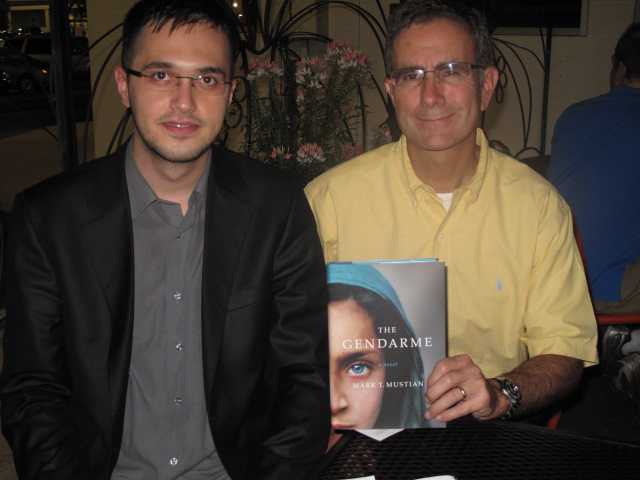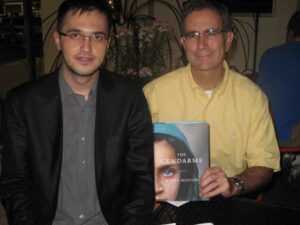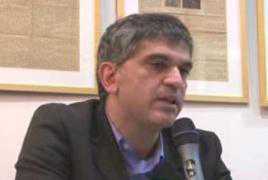Vahe Sarukhanyan
23:53, April 28, 2011
“You are of course aware that genocides can also be perpetrated by individuals and not by governments.”
This was the remark made by Mensur Akgun, Director of the Global Political Trends Center (GPOT) in Istanbul where I had a chance to meet and talk with him during my stay here.
I had posed the following question, to Mensur Akgun.
Who should resolve the Armenian Genocide issue –political leaders or historians?
 “The issue isn’t connected to historians. The Turkish side has numerous documents attesting to the fact that there was no premeditation. The Armenian side has just as many documents to the contrary. But if the historians can reach some general consensus, their conclusions can be presented to the politicians. Then, there is a good chance that the matter will go to arbitration. If the Genocide was carried out by specific individuals in specific location in Turkey, the Turks would be obliged to recognize it. But, of course, there would be political, juridical and historical elements involved. You are of course aware that genocides can also be perpetrated by individuals and not by governments. Each side could learn much from assembling historians, the development of political agreement and from the experience obtained in resolving that issue. By the way, even if we don’t achieve all this, and just are able to normalize relations, then no one will talk about the Genocide. It’s more likely that Turks and Armenians would commemorate April 24 together. Many people commemorate April 24 as a day of calamity and not genocide. Of course, there will be certain Armenians and Turks not content with this but this displeasure won’t make a difference. We must act so that this issue is no longer up for political discussion. Naturally, it can continue to be a matter for personal debate. Many of you have suffered, I have no doubts.”
“The issue isn’t connected to historians. The Turkish side has numerous documents attesting to the fact that there was no premeditation. The Armenian side has just as many documents to the contrary. But if the historians can reach some general consensus, their conclusions can be presented to the politicians. Then, there is a good chance that the matter will go to arbitration. If the Genocide was carried out by specific individuals in specific location in Turkey, the Turks would be obliged to recognize it. But, of course, there would be political, juridical and historical elements involved. You are of course aware that genocides can also be perpetrated by individuals and not by governments. Each side could learn much from assembling historians, the development of political agreement and from the experience obtained in resolving that issue. By the way, even if we don’t achieve all this, and just are able to normalize relations, then no one will talk about the Genocide. It’s more likely that Turks and Armenians would commemorate April 24 together. Many people commemorate April 24 as a day of calamity and not genocide. Of course, there will be certain Armenians and Turks not content with this but this displeasure won’t make a difference. We must act so that this issue is no longer up for political discussion. Naturally, it can continue to be a matter for personal debate. Many of you have suffered, I have no doubts.”
The analyst says that the issue of rapprochement between Ankara and Yerevan periodically pops up on the official radar as an agenda item, but that Turkey doesn’t view it as a primary concern.
In contrast, Mr. Akgun argues that Armenia has two large problems with Turkey and Azerbaijan.
“Since there is hope for normalization, you discuss that issue at length. You always refer to history, which arises from the interests of your political circles, because otherwise you’d start to talk about other issues; for example corruption.
Mr. Akgun added that Turkey has many other problems besides this and points to the militarization of the country and the Kurdish issue.
Thus, he says that it is only logical that Turkey is more often discussed in Armenia than Armenia is in Turkey.
A similar view is expressed by Sabiha Gundogar, Foreign Affairs Program Officer at the TESEV (Turkish Economic and Social Studies Foundation).
“It is my impression that they want immediate improvement in relations in Armenia and that the border open tomorrow. They want recognition of the Genocide within one year. But the process in Turkey is a gradual one. The Armenian issue was never at the top of the list in Turkey and will never be.”
Mr. Akgun told me that Turkey is developing and becoming more self-confident. He said that Turkey would not benefit in a tangible way from opening the border with Armenia.
“Sure, tourists would come and go but there isn’t much trade going on. Also, sadly, you don’t have the natural resources like Azerbaijan. We can’t make the same investments in Armenia to get oil or gas. We have invested billions in Azerbaijan. Perhaps we could purchase a few refrigeration units and a handful of “Beko” stores in Yerevan, but not more. Your population is tiny and Armenia isn’t developed economically. We see no long-term economic potential in Armenia. There is no comparison with Azerbaijan. In addition, we regard the Azerbaijanis as brothers. That’s another story. If you had oil, then I can assure you that would have been a good reason to normalize relations.”
When I asked Aypars Gorgulu, anther analyst who works for Gundogar, is Armenia interests Turkey from an economic standpoint, he replied – “not really”.
“Turkey’s eastern regions aren’t that developed. Armenia is the same. Thus, the opening of the border would have limited economic repercussions. That’s not to say that Armenia isn’t interesting. I think that Turkey’s eastern districts would benefit somewhat from an open border. Turkey is heavily dependent on Georgia in many ways; the transit gas and oil pipelines. This makes Armenia an isolated island. An opening of the borders would create transit possibilities because even though the parties seek to isolate Armenia and focus on Georgia, the latter isn’t all that stable a country. We saw that with the war with Russia. Thus, we have to explore alternative paths. Armenia could greatly benefit from an opening of the border.
via Istanbul Diary: Turkish Analyst “Back Pedals” on Genocide Responsibility | Hetq online.
 President Micheline Calmy-Rey has held talks with Armenian President Serzh Sargsyan over a Swiss-mediated deal aimed at normalising relations with Turkey.
President Micheline Calmy-Rey has held talks with Armenian President Serzh Sargsyan over a Swiss-mediated deal aimed at normalising relations with Turkey.






